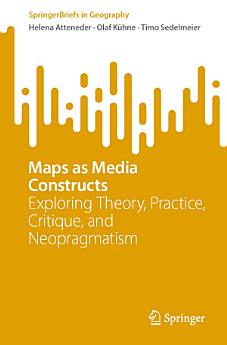Maps as Media Constructs: Exploring Theory, Practice, Critique, and Neopragmatism
About this ebook
About the author
Olaf Kühne is a university professor at the Eberhard Karls University of Tübingen, Germany. Prior to his appointment at the University of Tübingen, the geographer and sociologist, who holds a doctorate and habilitation, was a professor at the Weihenstephan-Triesdorf University of Applied Sciences and at the University of Saarland and held various positions (as a consultant, head of department and head of staff unit) in various Saarland ministries, here in the areas of nature conservation, regional planning and demographic change. In his research, Olaf Kühne deals theoretically with neopragmatism, social constructivism and conflict theory. Thematically, his research focuses on landscape and spatial conflicts, regional geography, cartography and urban development. His spatial focus is on East-Central Europe, Germany, Italy and the United States of America, in particular the South and West.
Timo Sedelmeier studied Geography and European Ethnology at the Albert-Ludwigs-University in Freiburg i.Br., German, where he also completed his doctorate in Geography. After working as an academic assistant at the PH Freiburg, he moved to a junior lectureship in human geography at the Eberhard Karls University of Tübingen, Germany, in 2012. In 2018, he was appointed Academic Councilor, and since 2022 he has been a Senior Academic Councilor at the Chair of Urban and Regional Development. His research focuses on poverty research and food geography.
Helena Atteneder is a senior lecturer („akademische Rätin a. Z.“) at the Institute for Media Studies, University of Tübingen, Germany. Her current research interests include critical perspectives on media practices in post-digital cities and theories of spaces/places, media and power. She is a founding member and spokesperson of the GfM working group "Media Geographies". With her project "Media and Mobility in the Digital City", she is part of the Baden-Württemberg Foundation's elite programme for postdoctoral researchers.





